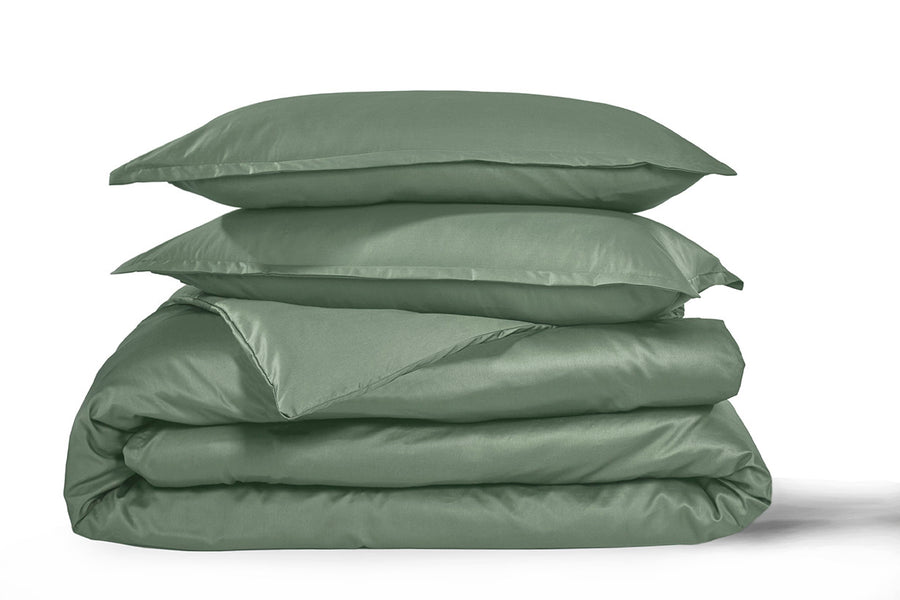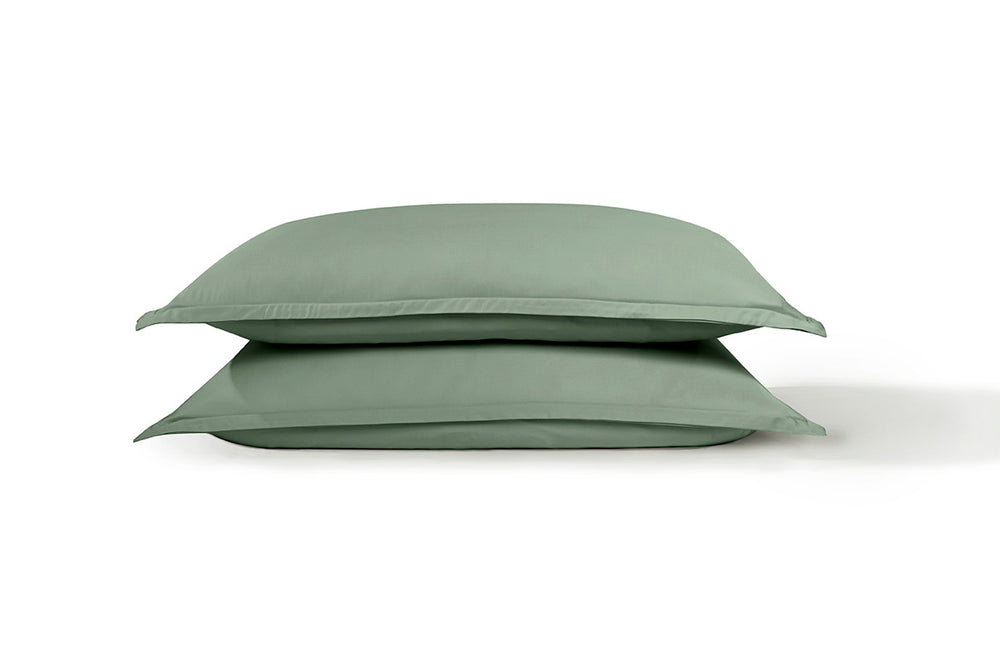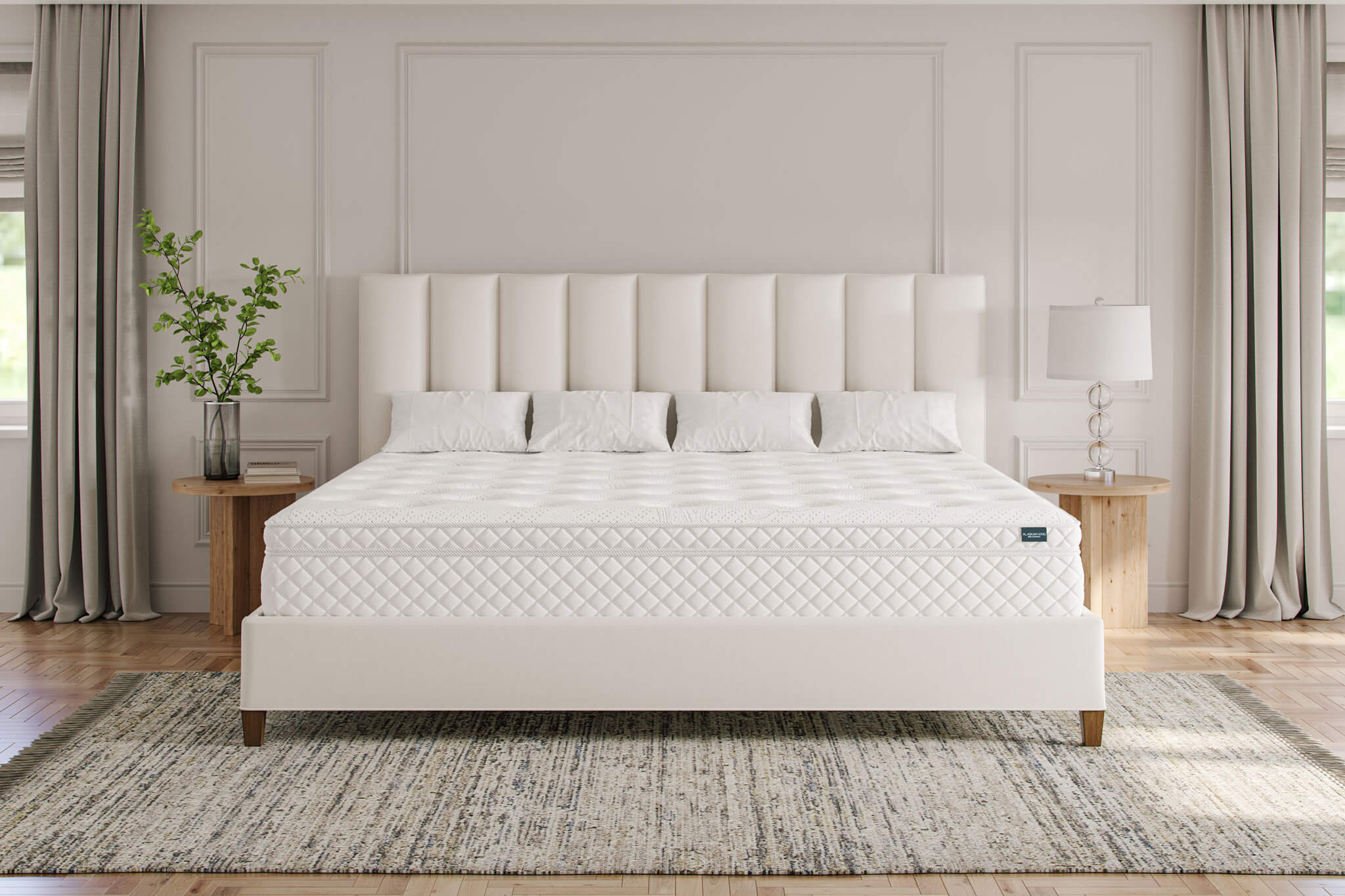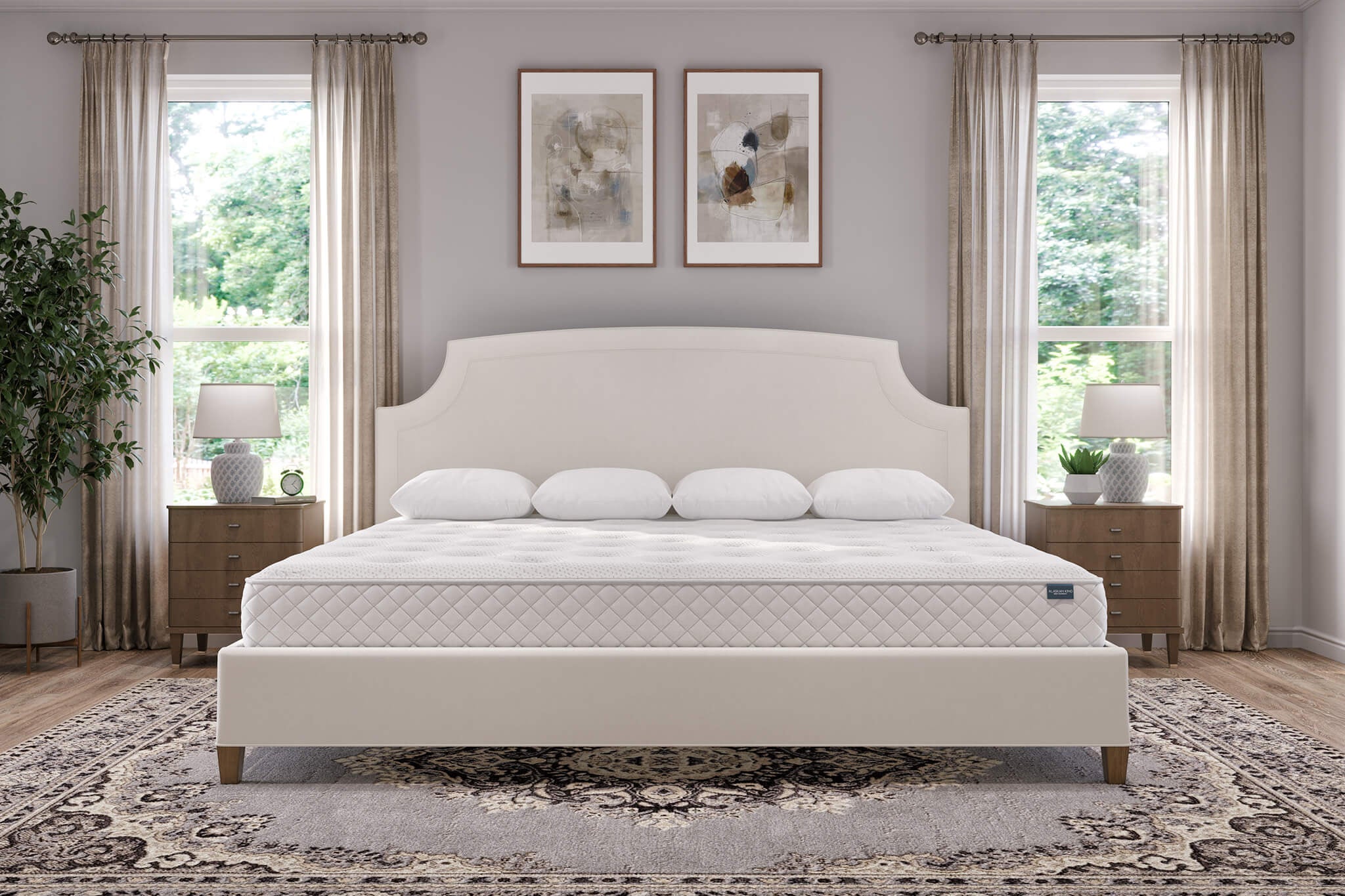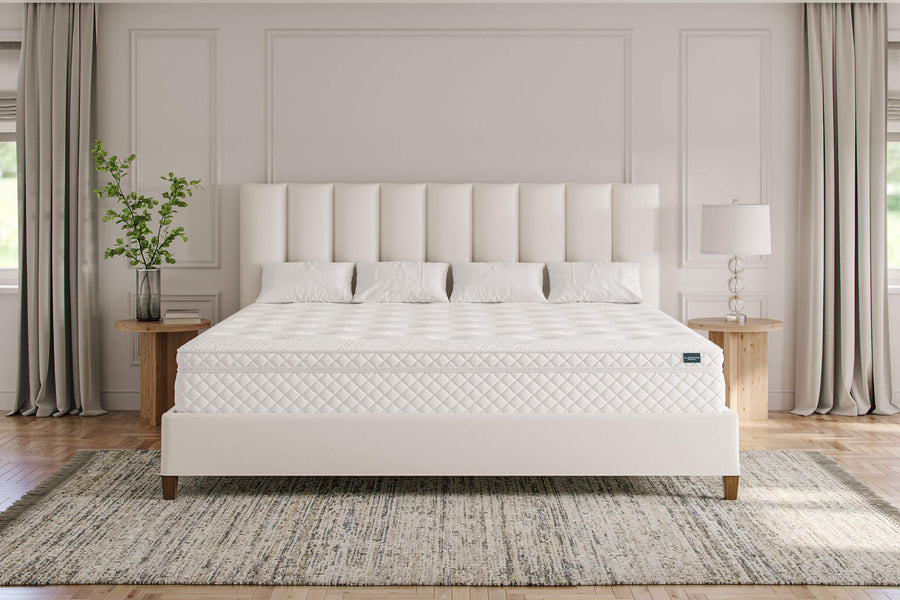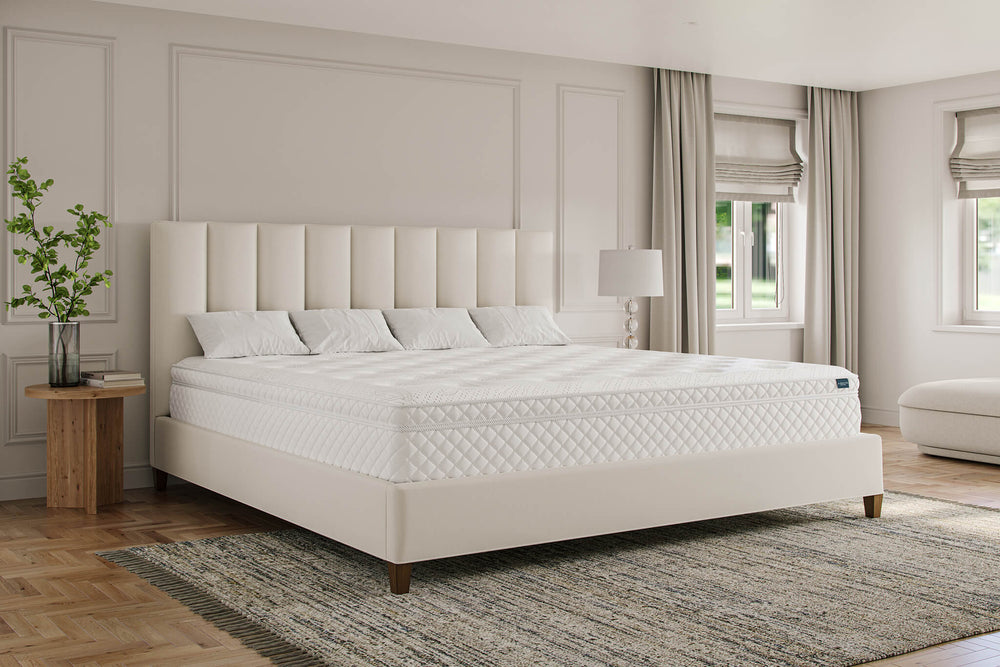Sleep & Mental Health: Tips to Create a Stress-Free Bedroom
Sometimes, your bedroom can feel more like a source of stress than a place of rest. As a result, it may feel impossible to get as much sleep as you need.
Poor rest can leave you feeling irritable, anxious, and mentally drained, creating a vicious cycle that affects your daily life and overall mental health. The more you stress about sleep, the harder it becomes to achieve.
Luckily, we have some tips for creating a stress-free bedroom that supports restful sleep and good mental health. Use them to get that deep, restorative sleep that helps you wake up refreshed and ready to tackle the day.

What’s the Connection Between Sleep and Mental Health?
Adequate sleep is essential for emotional regulation, cognitive function, and overall well-being. Poor rest makes mental health issues worse. But what’s interesting is that mental health problems also contribute to inadequate sleep.
Research has shown that inadequate sleep can lead to frequent mental distress. A study found that individuals who slept less than six hours per night were 2.5 times more likely to experience frequent mental distress compared to those who slept longer.
To make things even worse, chronic sleep deprivation increases the risk of developing serious mental health conditions.
People who consistently sleep fewer than five hours per night are more likely to suffer from depression, anxiety, and dependence on nicotine and alcohol.
But that’s not all.
Although young adults who don’t get enough sleep have the most consequences on mental health, those who sleep more than nine hours per night also face negative effects. That’s because excessive sleep can be associated with underlying health problems and can contribute to feelings of lethargy and depression.
So, sleep and mental health are closely connected. The good news is that improving sleep can also contribute to better mental health.
A 2021 meta-analysis revealed that when individuals extended their sleep duration, they experienced significant improvements in mental health, including reductions in stress, anxiety, and depression.
Let’s see how you can do that.
Assess Your Current Sleep Environment
Understanding how your sleep environment impacts sleep can help you identify and eliminate stressors that interfere with your ability to get adequate rest.
Factors such as clutter, noise, and lighting can disrupt your sleep cycle, leading to frequent awakenings and difficulty falling asleep. By addressing these disturbances, you can create a peaceful bedroom that supports a good night’s rest.
Here’s a quick checklist you can use to assess your current sleep environment and figure out how to improve it:
1. Clutter
- Is your bedroom free of unnecessary items and clutter?
- Are surfaces like nightstands and dressers tidy and organized?
- Do you have a designated place for everything to reduce the visual chaos?
2. Noise
- Are there sources of noise that disrupt your sleep, such as traffic, appliances, or electronic devices?
- Do you use earplugs or white noise machines to mask disruptive sounds?
- Are windows and doors adequately sealed to block external noise?
3. Light
- Is your bedroom exposed to external light sources at night, such as streetlights?
- Do you use blackout curtains or shades to create a dark sleeping environment?
- Are all electronic devices, including phones and alarm clocks, set to a low light or turned off?
4. Temperature
- Is your bedroom temperature set to a comfortable level?
- Do you have appropriate bedding for the season to maintain a comfortable body temperature?
5. Bedding
- Is your mattress comfortable and supportive?
- Are your pillows suitable for your sleeping position and free of allergens?
- Do you regularly clean and replace your bedding to ensure it is fresh and hygienic?
6. Smell
- Does your bedroom have a pleasant, calming scent?
- Do you use essential oils or scented candles to promote relaxation?
7. Technology
- Do you use electronic devices before bed that disrupt your sleep?
- Have you considered creating a tech-free zone in your bedroom to minimize distractions?
Tips for Creating a Stress-Free Sleep Zone
If you’re serious about improving sleep and mental health, it’s time to take matters into your own hands.
These tips can help you transform your bedroom into a stress-free sleep zone:
1. Declutter Your Space
A cluttered bedroom can contribute to stress and anxiety, making it difficult to relax and fall asleep.
That’s why you should only keep essential items in your bedroom to maintain a sense of order. Here’s how to do that:
- Start by decluttering surfaces like nightstands and dressers
- Use storage bins, shelves, and drawers to keep items out of sight
- Consider under-bed storage for less frequently used items
- Spend a few minutes each day tidying up to maintain a clutter-free space
2. Control Noise Levels
If you often wake up at night due to loud noise, you can try some of these tips:
- Use a white noise machine or fan to create a consistent background noise and mask disruptive sounds
- Invest in comfortable earplugs to block out noise
- Consider soundproofing your bedroom with heavy curtains, carpets, or acoustic panels
3. Optimize Lighting
Exposure to artificial light, especially blue light from screens, can interfere with your body’s natural sleep-wake cycle.
To minimize these disruptions, you can:
- Install blackout curtains to block out external light and create a dark sleeping environment
- Use dimmable lights or lamps with warm-toned bulbs in the evening to create a relaxing atmosphere
- Avoid using electronic devices at least an hour before bed
4. Choose Calming Colors and Textures
The colors and textures in your bedroom can influence your mood and ability to relax. That’s why you should use calming colors like soft blues, greens, or neutrals to help you unwind.
In addition, soft bedding materials such as cotton or bamboo can help create a comfortable environment.
You can also add elements like throw pillows, rugs, and curtains in calming textures to support the serene feel of your bedroom.
5. Try Aromatherapy
Aromatherapy can help reduce stress and promote relaxation, making it easier to fall asleep. The easy way to start is to light scented candles in your bedroom before bedtime to create a relaxing environment. Just make sure to extinguish them before falling asleep.
You can also use a diffuser with essential oils such as lavender, chamomile, or cedarwood, which are known for their calming effects. Or spray your pillow with a sleep-promoting mist that contains essential oils for the same effect.
6. Invest in Quality Bedding
Using high-quality bedding is one of the biggest game-changers for better sleep. That’s because it is so comfortable that it instantly puts you in a relaxing mood.
So, what do you need to pay attention to?
Firstly, you need a mattress that provides the right balance of support and comfort for your sleeping position. We recommend an oversize mattress like the Alaskan King.
Second, you need to get pillows that suit your sleeping style to ensure proper neck and spine alignment.
Lastly, you should use soft, breathable sheets and duvet covers made from natural materials like cotton or bamboo.
7. Create a Relaxing Bedtime Routine
A relaxing bedtime routine signals to your body that it’s time to unwind and prepare for sleep. So, instead of scrolling social media, checking your emails, or binge-watching Netflix, you should choose a more relaxing activity. That may include reading a book, taking a warm bath, or practicing meditation.
The most important thing is to keep a consistent schedule. That means going to bed and waking up at the same time every day, even on weekends. This can make it easier to fall asleep and improve the overall quality of your nightly rest.
Lastly, you should avoid consuming caffeine or other stimulants close to bedtime because they can affect your sleep. The same goes for heavy meals or intense exercise.
How to Manage Stress and Anxiety to Improve Sleep
Life can be a whirlwind of responsibilities, from work deadlines to family commitments. Finding ways to manage stress throughout the day greatly affects how well you sleep at night. Here are some practical tips to help you stay calm and collected:
|
Tip |
What to do |
|
Practice mindfulness and meditation |
Take a few minutes each day to practice mindfulness or meditation to center your thoughts and reduce anxiety. Apps like Headspace and Calm make it easy to incorporate these practices into your routine. |
|
Exercise regularly |
Whether it’s a brisk walk, a yoga session, or a dance class, find something you enjoy and make it a part of your daily routine. |
|
Eat well |
A balanced diet can help stabilize your mood and energy levels. Eat whole foods and stay hydrated to keep stress at bay. |
|
Enjoy your hobbies |
Make time for activities you love, whether it’s reading, gardening, or playing a musical instrument. These moments of joy can be a great stress antidote. |
|
Set boundaries |
Avoid checking work emails or engaging in work-related tasks during your off-hours to disconnect and recharge. |
|
Use sleep-tracking apps |
Apps like Sleep Cycle and Pillow track your sleep patterns and provide personalized insights to help you identify areas for improvement. |
|
Try stress-management apps |
Apps like Calm and Headspace offer guided meditations and breathing exercises that can help reduce stress and improve sleep quality. |
Sleep the Night Away on an Alaskan King Mattress
Understanding the connection between sleep and mental health, assessing your current sleep environment, and implementing practical tips for creating a stress-free sleep zone can help improve your sleep quality and well-being.
Another great way to get better sleep is to upgrade your mattress to an Alaskan King.
With its spacious size and luxurious comfort, the Alaskan King mattress provides plenty of room to stretch out, which reduces disturbances and promotes more restful sleep.
Explore our Alaskan King mattresses and start your journey toward better sleep and mental health.

